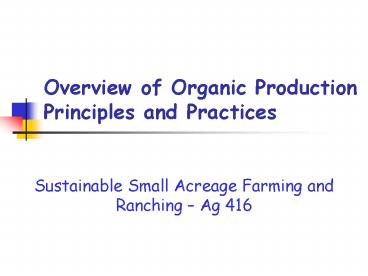Overview of Organic Production Principles and Practices - PowerPoint PPT Presentation
1 / 35
Title:
Overview of Organic Production Principles and Practices
Description:
Overview of Organic Production Principles and Practices Sustainable Small Acreage Farming and Ranching Ag 416 Introduction to Organics Brief history and ... – PowerPoint PPT presentation
Number of Views:359
Avg rating:3.0/5.0
Title: Overview of Organic Production Principles and Practices
1
Overview of Organic Production Principles and
Practices
- Sustainable Small Acreage Farming and Ranching
Ag 416
2
Introduction to Organics
- Brief history and current status of organic
production in Idaho and US - Overview of organic principles that guide farmer
production decisions. - Introduction to organic practices and tools.
3
Introduction to Organics
- The term organic gardening is of fairly recent
origin. - Early history of the word and the movement is
important to look at to understand the
complexities of the modern day issues related to
organic agriculture.
4
The National Organic Standards Board defines
organic as
- an ecological production management system
that promotes and enhances biodiversity,
biological cycles and soil biological activity.
It is based on minimal use of off-farm inputs and
on management practices that restore, maintain
and enhance ecological harmony.
5
Growth of Organic Industry in the U.S.
- Acreage of major crops increasing
- Consumer demand continues to grow
- Organic sales in 2001 reached 9 billion dollars
6
(No Transcript)
7
(No Transcript)
8
Growth in Idaho Organic production 1990 - 2001
Number of Producers Number of Acres Gross organic sales
1990 11 757 695,000
2001 132 106,058 5,503,000
9
(No Transcript)
10
(No Transcript)
11
(No Transcript)
12
Introduction to Organics
- The production and marketing of organic foods is
now subject to federal regulation. - Use of the term ORGANIC is controlled, vs.
natural, pesticide free or other marketing
terms used by growers. - Growers must have an organic plan for their
farm.
13
USDAs Role
- Accredit certifying agents
- Compliance and enforcement
- Publicize new and amended regulations
- Perform equivalence determinations
- Approve State organic programs
14
Certification Basics
- Organic systems plan
- Crops build soil fertility, use few synthetics,
minimize pollution - Livestock origin, feed, healthcare, living
conditions - Handling/processing pest management, prevent
co-mingling - An example of a farm management plan similar to
the Whole Farm Plan we are doing for class.
15
Certification Basics
- Use only approved substances/practices
- No genetic engineering, irradiation, sewage
sludge - National List all naturals allowed all
synthetics prohibited except for whats on the NL - Mandatory verification through inspections
- Initial site inspection
- Annual site inspection
- As many as needed to determine compliance
16
Certification costs
- Registration cost is annual
- Based on whether you are certified organic or a
registered organic grower making less than
5000 in gross sales - Currently there are federal cost-share programs
to help with certification expenses. - The cost for mandatory inspections will depend
on inspectors time and mileage and any lab fees.
17
Transitioning to Organics
- Three year period to verify no chemicals used on
property - A whole new world of management, production,
marketing and regulatory skills may be required! - Yields of field crops may decline until the
ecological system balances out (and when the farm
manager masters the organic management approach).
18
Principles of Organic Production
- Biodiversity
- Diversification and Integration of Enterprises
- Sustainability
- Natural Plant Nutrition
- Natural Pest Management
- Integrity
19
Biodiversity
- Promotes higher level of stability in ecological
systems. - Supports beneficial
- organisms
20
Diversification and Integration of Enterprises
- Combining enterprises to get more efficient use
of resources. - Also reduce risk higher level of economic
stability
21
Sustainability
- Following practices that promote agricultural
sustainability - Environmental protection of resources
- Reduced erosion by conservation tillage
- Limiting non-renewable energy consumption
- instead using biodiesel fuels, draft horses,
solar and wind power, etc.
22
Natural Plant Nutrition
- Crop nutrition from nourished organisms that are
responsible for biological, structural mineral
processes in the soil. - Accomplished by
- Avoidance of synthetic fertilizers or pesticides,
and excessive tillage - Supplementing organic matter and rock minerals
23
Natural Pest Management
- View of problems due to insects, diseases and
weeds as indicators of ecological imbalances. - Not tending to eradicate but reduce damage to
economic acceptable levels.
24
Integrity
- Organic certification provides guarantee about
production methods to a customer - Process requires maintaining records of
production practices - Also requires monitoring of progress to increase
efficiency and adherence to laws
25
Some Tools and Practices
- Planned Crop Rotation
- Green Manures
- and Cover Crops
26
Tools and Practices continued
- Adding Manure and Compost
- Intercropping and Companion Planting
27
Tools and Practices continued
- Biological Pest Control
- Bio-rational Pesticides
28
Tools and Practices
- Buffers and Barriers
- Sanitation
29
- Mulching
30
Tools and Practices continued
- Tillage Cultivation
31
Other Tools and Practices
- Burning
32
- Record-keeping
33
Marketing is an important part of organic
production success
34
For more information on Organic Production
- Idaho State Department of Agriculture
- http//www.agri.id.us
- National Organic Program
- http//www.ams.usda.gov/nop/
35
Summing Up
- Organic industry is growing!
- Principles guide organic production decisions
- Numerous tools and practices that can be employed
to meet principles - Specific National Organic standards must be
followed in order to receive organic
certification.































